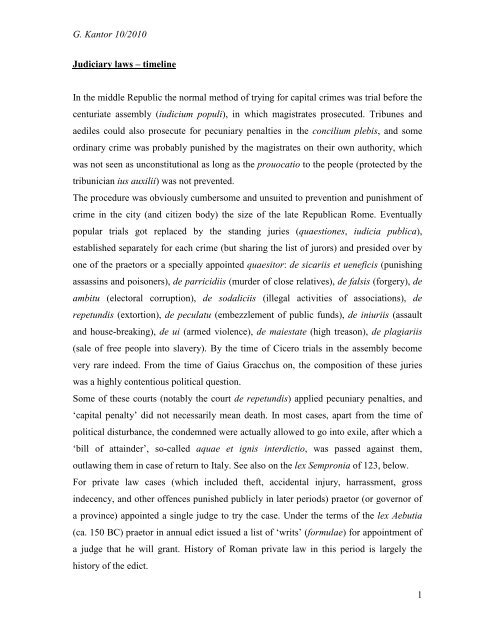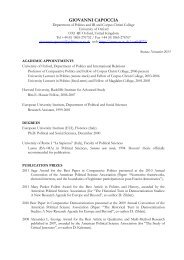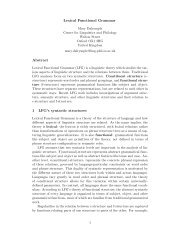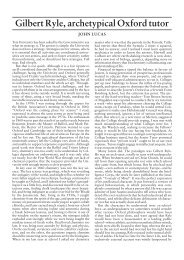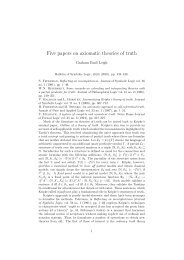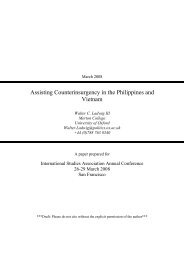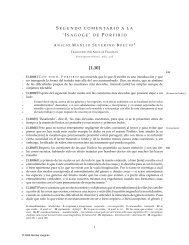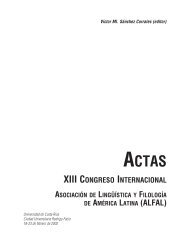Judiciary laws – timeline
Judiciary laws – timeline
Judiciary laws – timeline
Create successful ePaper yourself
Turn your PDF publications into a flip-book with our unique Google optimized e-Paper software.
G. Kantor 10/2010<br />
<strong>Judiciary</strong> <strong>laws</strong> <strong>–</strong> <strong>timeline</strong><br />
In the middle Republic the normal method of trying for capital crimes was trial before the<br />
centuriate assembly (iudicium populi), in which magistrates prosecuted. Tribunes and<br />
aediles could also prosecute for pecuniary penalties in the concilium plebis, and some<br />
ordinary crime was probably punished by the magistrates on their own authority, which<br />
was not seen as unconstitutional as long as the prouocatio to the people (protected by the<br />
tribunician ius auxilii) was not prevented.<br />
The procedure was obviously cumbersome and unsuited to prevention and punishment of<br />
crime in the city (and citizen body) the size of the late Republican Rome. Eventually<br />
popular trials got replaced by the standing juries (quaestiones, iudicia publica),<br />
established separately for each crime (but sharing the list of jurors) and presided over by<br />
one of the praetors or a specially appointed quaesitor: de sicariis et ueneficis (punishing<br />
assassins and poisoners), de parricidiis (murder of close relatives), de falsis (forgery), de<br />
ambitu (electoral corruption), de sodaliciis (illegal activities of associations), de<br />
repetundis (extortion), de peculatu (embezzlement of public funds), de iniuriis (assault<br />
and house-breaking), de ui (armed violence), de maiestate (high treason), de plagiariis<br />
(sale of free people into slavery). By the time of Cicero trials in the assembly become<br />
very rare indeed. From the time of Gaius Gracchus on, the composition of these juries<br />
was a highly contentious political question.<br />
Some of these courts (notably the court de repetundis) applied pecuniary penalties, and<br />
‘capital penalty’ did not necessarily mean death. In most cases, apart from the time of<br />
political disturbance, the condemned were actually allowed to go into exile, after which a<br />
‘bill of attainder’, so-called aquae et ignis interdictio, was passed against them,<br />
outlawing them in case of return to Italy. See also on the lex Sempronia of 123, below.<br />
For private law cases (which included theft, accidental injury, harrassment, gross<br />
indecency, and other offences punished publicly in later periods) praetor (or governor of<br />
a province) appointed a single judge to try the case. Under the terms of the lex Aebutia<br />
(ca. 150 BC) praetor in annual edict issued a list of ‘writs’ (formulae) for appointment of<br />
a judge that he will grant. History of Roman private law in this period is largely the<br />
history of the edict.<br />
1
G. Kantor 10/2010<br />
149. Lex Calpurnia de repetundis <strong>–</strong> first standing court established. Senatorial juries.<br />
Between 149<strong>–</strong>123. Lex Iunia de repetundis <strong>–</strong> known only from a reference in the<br />
epigraphic extortion law, content unknown.<br />
137. Lex Cassia tabellaria establishes secret ballot in the iudicia populi (except those for<br />
perduellio).<br />
123 (probably early in the year). Gracchan lex ne quis iudicio circumueniatur establishes<br />
a penalty for ‘conspiracy to divert the course of justice’ for senators only (still in<br />
force in the same form at the time of Cic., Cluent. 151). Presumably, equestrian<br />
participation in the juries not yet contemplated by Gaius Gracchus at this stage.<br />
Later incorporated into the lex Cornelia de sicariis of 81. Special standing court<br />
perhaps not established.<br />
123. Lex Sempronia de capite ciuis Romani forbids execution of Roman citizens iniussu<br />
populi (this is not in the later period construed to apply to quaestiones, which<br />
were created by a law of the Roman people, though actual death punishment falls<br />
out of use, and was perhaps seen as inappropriate in the absence of actual popular<br />
decision).<br />
123 or 122 (Gracchus’ second tribunate). Lex Acilia de repetundis (Cic., Verr. 1.51 for<br />
the title) = epigraphic law of the Tabula Bembina (RS no. 1) = Gracchan law.<br />
Equestrian juries. Whether there was a separate lex Sempronia iudiciaria<br />
(covering private law judges and other quaestiones, if any existed at that date)<br />
remains debatable.<br />
121. An ‘emergency decree’ (so-called senatus consultum ultimum, cf. Caesar, Civil War<br />
I.5 for the origin of the expression) is passed by the consul L. Opimius against<br />
Gaius Gracchus and his supporters. An exemption from the lex Sempronia de<br />
capite ciuis is later claimed for murders during its operation, a precedent used a<br />
number of times in the later period, notably by Marius in 100 and Cicero in 63.<br />
116. Gaius Marius is tried for ambitus by a quaestio (Plut., Marius 5.3), perhaps specially<br />
established for that purpose, rather than a standing court.<br />
2
G. Kantor 10/2010<br />
110. Quaestio Mamilia <strong>–</strong> consisting of Gracchani iudices (Cic., Brut. 128) to try those<br />
bribed by Iugurtha. Had a generally bad reputation (aspere uiolenterque, Sall., BJ<br />
40; inuidiosa, Cic., Brut. 128, see further Greenidge/Clay, pp. 68<strong>–</strong>9).<br />
106. Lex Seruilia de repetundis (passed by the consul Q. Servilius Caepio,<br />
who was defeated next year by the Cimbri) <strong>–</strong> mixed juries.<br />
107. Lex Caelia tabellaria extend secret vote to the iudicia populi for perduellio.<br />
103. Lex Appuleia maiestatis <strong>–</strong> equestrian quaestio for maiestas established (perhaps not<br />
in permanent existence, but convened specially in case of need, see also below on<br />
the lex Varia of 90).<br />
101. Lex Seruilia de repetundis (passed by the tribune Servilius Glaucia) <strong>–</strong> re-establishes<br />
equestrian juries for the repetundae court.<br />
92. Trial and condemnation of P. Rutilius Rufus for extortion, universally condemned as<br />
unjust (Greenidge/Clay, pp. 125<strong>–</strong>7, for a good selection of sources).<br />
91. Tribune M. Livius Drusus tries to reestablish mixed juries: law passed, but repealed<br />
almost immediately.<br />
90. Lex Varia <strong>–</strong> establishes an equestrian quaestio to judge those who instigated the<br />
Italian rebellion (effectively for maiestas).<br />
89. Lex Plautia <strong>–</strong> changes the composition of the quaestio Variana to mixed senatorial /<br />
equestrian.<br />
86. The existence of a quaestio de peculatu first firmly attested (Plut., Pomp. 4), though it<br />
could have been specially convened for the occasion rather than permanent.<br />
81. Leges Corneliae iudiciariae (maiestatis, repetundarum, de sicariis et ueneficis, de<br />
falsis, de iniuriis, de peculatu, perhaps de ambitu) <strong>–</strong> senatorial juries for all<br />
quaestiones, comprehensive reform of criminal law. At least the quaestio de<br />
sicariis pre-dated Sulla (Cic., Rosc. Am. 11); see above on the quaestiones de<br />
peculatu, de maiestate, and de ambitu, which may not have been permanently in<br />
operation in the preceding period. It is very probable (but not definitely attested)<br />
that on top of <strong>laws</strong> for specific jury courts there was a general lex Cornelia<br />
iudiciaria on the composition of the jurors’ list for all quaestiones.<br />
3
G. Kantor 10/2010<br />
78. Lex Lutatia de ui establishes a new quaestio (initially dealing with the supporters of<br />
Lepidus). Replaced or supplemented by a lex Plautia between 78<strong>–</strong>63 and a lex<br />
Pompeia (aimed at quelling the violence after the murder of Clodius) in 52.<br />
77. Trial of Q. Calidius for repetundae (claims after conviction that the going rate for<br />
convicting an innocent praetorian is 300,000 HS, Cic. Verr. 1.38).<br />
74. Scandalous trial of Oppianicus. Many bribed jurors later expelled from the Senate by<br />
the censors of 70.<br />
70. Trial of Gaius Verres. (Later in the year) Lex Aurelia iudiciaria <strong>–</strong> juries of senators /<br />
equestrians / tribuni aerarii. Cornelian <strong>laws</strong> remain in force as regards<br />
substantive law, only the composition of juries is changed.<br />
Before 63. Lex Fabia de plagiariis establishes a new court to punish sale of free people<br />
into slavery.<br />
67. Lex Calpurnia de ambitu increases penalties for electoral corruption.<br />
63. Lex Tullia de ambitu does the same.<br />
Spring 63. Trial of C. Rabirius, who was accused of killing the tribune Saturninus under<br />
‘emergency decree’ in 100, for perduellio (defended by Cicero in a surviving<br />
speech), the best (and latest) known iudicium populi in the late Republic.<br />
December 63. Execution of the Catilinarians by Cicero after a senatorial debate, in<br />
contravention of the lex Sempronia of 123.<br />
61. A special quaestio set up to try Clodius for violating the mysteries of Bona Dea.<br />
59. Lex Iulia repetundarum <strong>–</strong> much more comprehensive than the Sullan, does not touch<br />
the composition of the juries. Lex Fufia requires that the votes of the panels of<br />
senators, equestrians and tribuni aerarii be counted separately, to prevent<br />
corruption being blamed on another panel (Cassius Dio 38.8.1).<br />
58. Lex Clodia de capite ciuis Romani reaffirming the lex Sempronia and aimed at<br />
Cicero’s actions in December 63.<br />
55. Lex Licinia de sodaliciis and Lex Pompeia de parricidio establish new standing<br />
courts.<br />
46. Lex Iulia iudiciaria <strong>–</strong> the panel of tribuni aerarii abolished by Caesar. Reversed by<br />
the lex Antonia of 44.<br />
4


